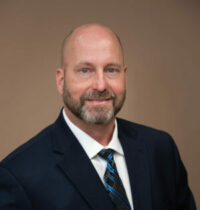As part of CEO Insights series, the Chief Executives Council recently interviewed Jay Williamson, CEO of American Southwest Credit Union, MS – Management and Leadership. Our vision is to promote prosperity and build community. We strive to make a meaningful impact on rural Arizona.
vision is to promote prosperity and build community. We strive to make a meaningful impact on rural Arizona.
Jay is passionate about growing leaders, organizations and communities. I’m a servant leader who understands how to cultivate an award-winning corporate culture that drives long term growth in assets, member/customer acquisition, eliminate wasteful spending, decreases employee turnover and set new company highs in net profitability.
1. What inspired you to pursue a C-Suite career?
A: There wasn’t one thing which drove me to become a CEO, but an accumulation of many things over my career. It started with my father, he was a small business owner and I grew up thinking I wanted to be like my dad. I just always assumed I would be some day, as simple as that sounds. Early in my career, I had the opportunity to work for two very different CEOs. The first was a very kind man and mentor. He really invested his time in me and gave me a lot of confidence in myself and abilities. He saw something in me, I hadn’t seen in myself. Something I had only aspired too, but not envisioned. He used his platform as a CEO to make a difference in the lives of those around him. The second was the complete opposite. He was the epitome of the narcissistic, screaming CEO who ran the company with the “my way or the highway” mentality. He made going to work miserable. Those two experiences, back-to-back, reinforced my drive to become a CEO. I saw what an impact, both positive and negative, a CEO could have on an organization and the people inside the organization. I aspired to be a CEO that made a positive difference in people. I knew I wanted to make sure others both had the great experience I did and didn’t have the horrible one.
2. What are the roles and responsibilities of a CEO and how has that changed over time?
A: Larger than the responsibility of a CEO is the responsibility of a leader. Leaders see more, faster. Leaders see the potential in others, often before they see it in themselves, and they work to maximize the collective potential. Whatever your title, you can do this where you are now. I tend to think the role and responsibility of the CEO changes dramatically with the skills of each CEO. Lean into your strengths and lead from those strengths. Take on the roles and responsibilities where you are the most skilled. One thing I believe every CEO should do, is lead the culture. You will whether you intend to or not, so be intentional about it. Others will expect you to set the vision for the organization and set the road map for achieving the organizations goals. One thing I believe has changed in the CEO role, is critical role of being positive and being a cheerleader for your people and organization. I think individual expertise used to be enough. Your knowledge was key. Now, you really need to bring a positive energy to the organization above and beyond knowledge. Leading the culture of the organization has become more important than your personal skills.
3. Please share some of the most interesting aspects of your job.
A: To me, what has been the most interesting an unexpected aspect of being a CEO is the extremes. Extreme highs and extreme lows. Some days I’m moping the floors after a flood and then I’m speaking to other organizations about our vision, discussing mergers and acquisitions, or helping design a new building. Then I’m trying to help a team member who just lost her husband and is suddenly a single mom. How do I help them emotionally, how can our organization help them financially in a time of extreme need? What is too much, what is too little? As the CEO, you are expected to handle the extremes. Resolve the problems others can’t, or won’t. To see and communicate the big picture, when others can only see the tree, you have to see the forest and be able to communicate it all well. It is unbelievable hard and frustrating and unbelievably rewarding, all at the same time.
4. What have been the most significant keys to your success?
A: The biggest key to success, for me, was preparing for success. I knew I wanted to be a CEO early on, so I did everything I could think of to be ready for the position and prepare myself for the position. I went to leadership conferences. I listened and took notes from the best. I read books. I accepted failure as part of success. I made countless mistakes and learned from them. Wrote them down, so I wouldn’t make them again. I took the jobs no one else wanted, the horrible situations. I knew I could learn more in a year from taking over a situation which had gone horribly wrong, than taking over a situation that was succeeding and on cruise control. Learn the numbers and how to read and understand balance sheets and profit & loss statements. The numbers tell a story, learn to read it. A mechanic reads a diagnostic test and knows which bolts to turn and parts to replace to get a smooth-running engine. In business, the diagnostic test is the balance sheet and profit and loss. I can’t prepare the numbers, but I know what each of them mean and how they correlate to organizational success. A second key to success, is understanding people. People are what make every organization either succeed or fail. Get your PHD is understanding people and how to motivate them.
5. What advice would you give to others that seek a CEO career?
A: Educate yourself any way you can. Seek out opportunity and then take it on. Don’t let fear of failure paralyze you. You are going to make mistakes, some of them could be huge. Own those mistakes and work like crazy to fix them. Be willing to work hard. There isn’t a substitute for hard work for sustainable, long-term success. Find mentors, ask questions. Finally, be extremely intentional. About everything. Know what you are doing, why you are doing it, what your expectations were, what information you had and how you are going to measure success or failure. Intentionality might be the most important advice I can give. When you become a CEO, listen to others around you. Good CEO’s don’t have all the answers, they know where to go to get the answers. Finally, use your platform to make a positive impact on those around you and those who will come behind you. It is your responsibility to leave it better than you found it and set up others for success.
The CEO Interview Series features experienced executives from a variety of organizations and industries. The fast-paced interview format focuses on “secrets to success” and will bring valuable learning, career advice and big ideas to both aspiring and seasoned corporate executives. Learn more here.


0 Comments